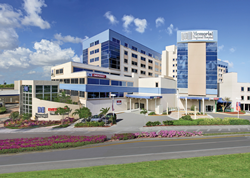
Memorial Regional Hospital, a Level 1 Trauma Center equipped to handle the most critical situations, is providing COVID-19 patients technology and caregiver support to assist with home quarantines.
“Connecting the clinical technical, and human elements, and keeping individuals out of hospitals whenever possible, has decreased patient anxiety while still delivering a superior level of care,” said Monica Puga, Memorial Healthcare System’s vice president of population health.
HOLLYWOOD, Fla. (PRWEB)
November 16, 2020
47-year-old Sam Nehme has been a professional athlete that still trains regularly. He eats right, takes care of his body, and has no underlying medical conditions. In short, he’s what many would consider the picture of good health.
That wasn’t; however, the way he felt upon arrival at Memorial Regional Hospital’s Emergency Department. With symptoms consistent with COVID-19, he expected to be admitted for observation while medical teams monitored if and how the disease progressed. Instead, he was sent home to self-quarantine, but with equipment and a support system created to help patients monitor themselves and avoid unnecessary hospital stays.
“For lower-risk patients in the early stages of the coronavirus, we’d rather they be in places they feel safe and comfortable,” said Dr. Eric Bassan, a physician specializing in emergency medicine at Memorial Regional Hospital. “For many, that’s in the privacy of their own home, surrounded by all that’s familiar to them. With enrollment in our CHOP program, that’s a viable option.”
CHOP, an acronym for Covid Home Oximetry Program, enables patients to monitor their oxygen levels and be alerted to a drop below the 92% threshold that would signal the onset of respiratory distress for patients with the virus. Individuals can update their status online through Memorial’s MyChart application and have regular contact with medical teams monitoring their situation from the hospital. Patients return to the ER if their circumstances warrant, but have peace of mind in the meantime if their symptoms aren’t out of the ordinary. “I spoke with nurses every morning, so I knew what to expect and what medications would help,” said Nehme. “Documenting my condition was huge because it kept my primary care physician and nurses informed and gave me the opportunity to ask pertinent questions. When I returned to the hospital, it was because I needed to be there, not because I was scared of something I didn’t understand.”
Nehme is one of more than 120 patients that have been enrolled in CHOP. Nearly half completed their quarantines at home, 24 were admitted to Memorial facilities, and, most importantly, no one has passed away. During surge periods, the program enabled beds within hospitals to be used by the sickest COVID-19 patients and doctors to focus on the most critically ill.
“We’ve had great feedback from our patients about the program,” said Monica Puga, Memorial Healthcare System’s vice president of population health. “Connecting the clinical technical, and human elements, and keeping individuals out of hospitals whenever possible, has decreased patient anxiety while still delivering a superior level of care.”
While CHOP was created in response to factors associated with the coronavirus, Dr. Bassan says it can expand to help monitor patients with other conditions, including chronic obstructive pulmonary disease (COPD), asthma, and congestive heart failure. Fluctuations in weight and peak air flow measurement are two other indicators of potentially serious problems in those with chronic conditions.
Meanwhile, it has been more than two months since Nehme’s oxygen saturation dropped to dangerously low levels and his pulse oximeter and medical team alerted him it was necessary to return to the ER. “I felt like I was going to die that day, but my post-COVID chest x-rays have been good and I’m back to being healthy again.”
Memorial Healthcare System is one of the largest public healthcare systems in the U.S. and a national leader in quality care and patient satisfaction. It is highly regarded for a patient and family-centered approach at facilities that include Memorial Regional Hospital, Joe DiMaggio Children’s Hospital, Memorial Regional Hospital South, Memorial Hospital West, Memorial Hospital Miramar, Memorial Hospital Pembroke, Joe DiMaggio Children’s Health Specialty Center in Wellington, and Memorial Manor nursing home.
Among its many awards and recognition are Modern Healthcare magazine’s “Best Place to Work in Healthcare,” Florida Trend’s “Florida’s Best Companies to Work For,” and Becker’s Hospital Review’s “150 Great Places to Work in Healthcare.” In a recent report (“Humanizing Brand Experience”), the Denver-based consulting firm Monigle named Memorial the top health system brand in America, based on consumer surveys.
To learn more, visit mhs.net.
Share article on social media or email:

